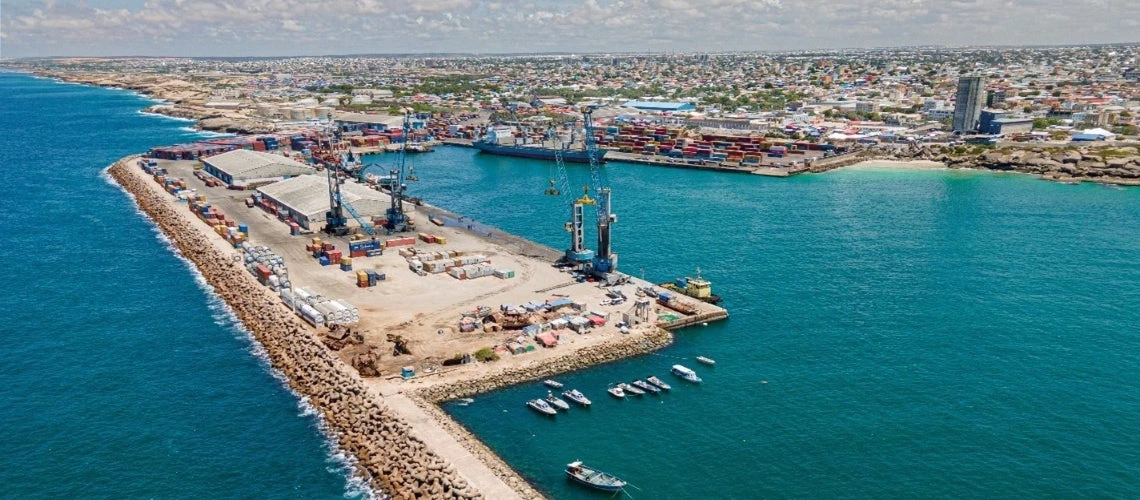 Mogadishu Port, Somalia. Photo by Mohamed Abihakim, World Bank
Mogadishu Port, Somalia. Photo by Mohamed Abihakim, World Bank
Somalia faces challenges on multiple fronts coming out of a civil war that ended in 2012 after the Transitional Federal Government and adoption of Provisional Federal Constitution. More than two-thirds of the population live in poverty with almost 20 percent unemployment rate. Hit hard by the COVID-19 pandemic, the country has also been plagued by natural disasters in 2020 and 2021.
However, sustained political, economic, and institutional reforms in the past decade have helped Somalia build core federal state capabilities. The country has consistently increased its domestic revenues since 2012 (except in 2020 due to the pandemic) and aims for a 15 percent tax to gross domestic product (GDP) ratio in the medium to long term.
Somalia’s strong commitment to domestic revenue mobilization reforms and harmonization efforts has positively contributed to the country’s tax yield in 2021 amidst a backdrop of challenges imposed by COVID-19. Somalia has brought tax revenue collection levels quickly back to an upward revenue trajectory after a decline in 2020.

Despite the steady progress achieved so far, tax revenues in Somalia are still quite low by international standards and the lowest in Africa, at 4.4 percent of GDP. Somalia needs to continue addressing fiscal challenges to counter fragility, enhance government legitimacy, and improve service delivery.
The Federal Government of Somalia (FGS) is preparing a Medium-Term Revenue Strategy in collaboration with the Federal Member States (FMS)—which are officially part of the country and subject to the authority of the federal government but have their own constitution and political agenda. The success of the reform initiatives will depend on the political will of the federal and member states to implement further reforms.
Strengthening Customs and Inland Revenue Administrations
To help finance the country’s human capital, infrastructure, and public service delivery needs, the federal government, with support from the World Bank Group, is building domestic revenue mobilization capacity of both the customs and inland revenue administrations.
Customs authorities are responsible for collecting taxes on imports or exports of good (tariffs) and controlling the flow of goods into and out of a country. Customs administration reforms play an important role in developing fiscal capacity and institutions in fragility settings as customs revenues constitute 30 percent to 50 percent of overall tax revenues in developing countries and up to 70% of revenue in fragile and conflict-affected states. Reforms supported by the World Bank in conflict-affected countries such as Madagascar and Cameroon show that enhancing the capacity of customs administration can significantly increase tax revenues and lead to an accountable, effective tax system, that creates mutual trust between citizens and states. Customs reform efforts in Madagascar, for instance, led to the growth of collected revenues from Ar 1255 billion in 2014 to Ar 2427.9 billion in 2018, almost doubled within four years while curbing tax evasion and facilitating trade.
The Somalia Customs Support Project, funded by the World Bank’s Global Tax Program (GTP), is helping the country build its national customs administration with increased capacity for tax collection and strengthened institutions for intergovernmental coordination. Fragmented customs operations will be incorporated into the national customs administration.

Since 2019, the project has facilitated high-level policy dialogue between the federal government and member states’ governments through a common Intergovernmental Fiscal Forum Technical Meetings (IGFFTM) platform. These engagements eventually led to the Customs High-Level Dialogue in 2021, bringing together the inland revenue and all five member states on the “whole of Somalia” basis for the first time. Despite the difficulties posed by COVID-19, federal and states’ governments agreed on a new national tariff schedule. This milestone—a significant political achievement for Somalia—is especially important because it helps the country meet requirements for the Heavily Indebted Poor Countries (HIPC) debt relief process.
Driving Change Through Data and Evidence-Based Approach
The World Bank project team provided Somalia with technical assistance and just-in-time advisory through research, training, and capacity-building activities. For example, a transport costs study enabled policy makers to better understand the potential competition between different economic centers of Somalia. A separate study assessed the enforcement, facilitation, and trust dimensions of customs compliance in Somalia’s three largest port cities.
We also helped determine staffing needs of both customs and inland revenue in the federal government and all five member states through the DRM Organizational Structures and Staffing Review. This study helped the Somalian government reach consensus on the organizational structures and potential solutions, motivating continued commitment for reform.
As Somalia prepares for the next phase of engagements to foster trust between the government and stakeholders including local leaders, trade associations, and civil society groups, the World Bank will continue to support the country’s mission to strengthen their customs and inland revenue administration.



Join the Conversation